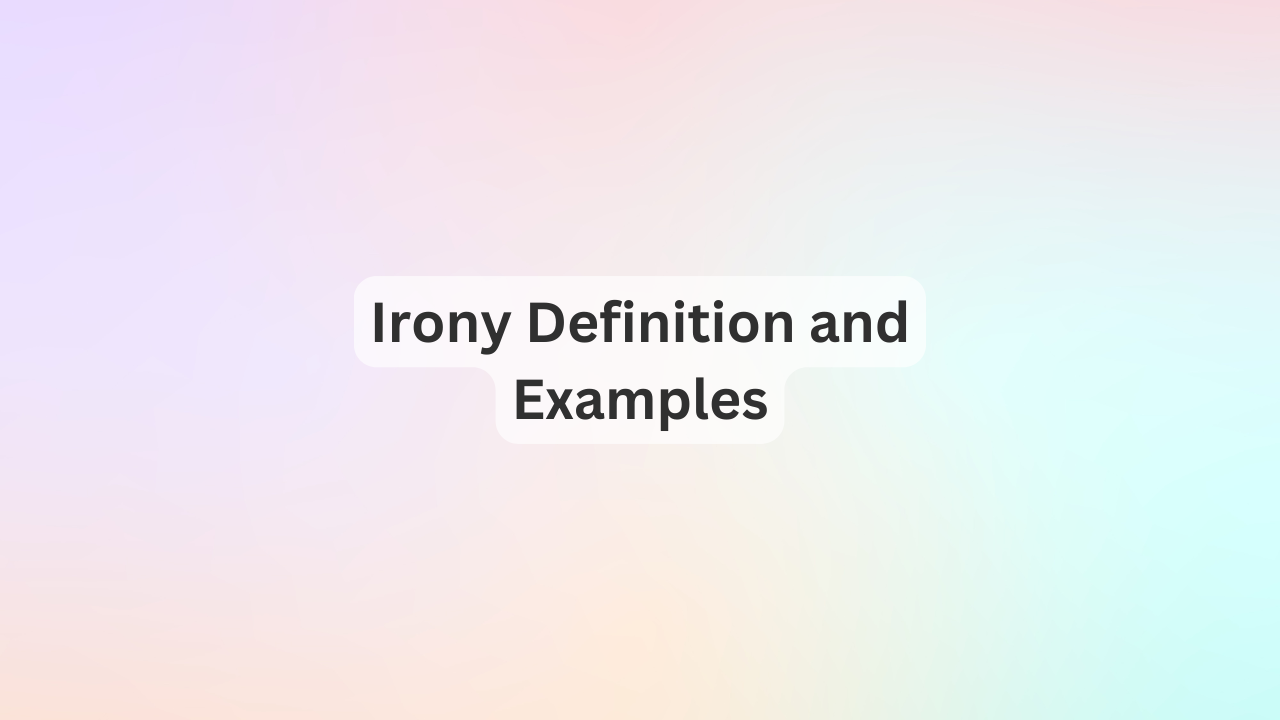Ever had a moment where you expect one thing to happen, but the complete opposite happens instead? Congratulations, you’ve just met irony! Irony is life’s way of keeping us on our toes and adding a little flavor to both storytelling and, let’s be honest, those awkward everyday moments. It’s like reality has a sense of humor, and sometimes, it loves to give us a cheeky wink.
Irony doesn’t just live in literature—it’s everywhere, waiting to turn expectations upside down. So, let’s dive into the wonderfully twisty world of irony, where nothing is ever quite what it seems.
Irony Definition: When Expectation and Reality Clash
Irony occurs when there’s a gap between what’s expected to happen and what actually happens. It’s the literary equivalent of life pulling a fast one on you. In a nutshell, irony creates contrast—whether it’s in situations, words, or actions—often with a humorous or biting edge.
There are a few different types of irony, but the most common are verbal irony (when you say the opposite of what you mean), situational irony (when the opposite of what you expect happens), and dramatic irony (when the audience knows something the characters don’t).
Irony Examples That Keep Us Smiling
- Verbal Irony:
Saying “Oh, great!” when you spill coffee on yourself five minutes before a meeting. (Spoiler: It’s not great.) - Situational Irony:
A fire station burns down. (So, uh, who do we call now?) - Dramatic Irony:
In Romeo and Juliet, we know Juliet isn’t really dead, but Romeo doesn’t—leading to some seriously tragic consequences. (Yikes.)
Why Irony Is So Fun (And Sometimes a Little Cruel)
Irony makes life interesting by adding twists and surprises when you least expect them. It’s like storytelling’s mischievous little cousin—always playing with your assumptions. Whether it’s used for humor, tension, or critique, irony can make a simple moment feel like it’s been flipped on its head.
It’s the unexpected “gotcha!” that keeps readers (and real-life audiences) engaged, and it’s also a great way to inject some wit or commentary into writing. Let’s be honest, though—sometimes irony is just life’s way of keeping us humble.
Frequently Asked Questions
What’s the difference between irony and sarcasm?
Sarcasm is a type of verbal irony that’s used to mock or express disdain, usually with a sharp tone. All sarcasm is ironic, but not all irony is sarcastic. (Think of sarcasm as irony with a bite!)
Is irony only used in literature?
Not at all! Irony pops up in real life all the time, from awkward social moments to unexpected outcomes. It’s everywhere, whether we realize it or not.
Why is irony important in storytelling?
Irony keeps stories fresh and unpredictable. It adds depth, humor, or tension, and it challenges readers’ expectations, making the narrative more engaging and thought-provoking.
Conclusion
Irony is that playful (and sometimes sneaky) twist that turns what you expect upside down. Whether it’s adding a touch of humor, highlighting a contradiction, or delivering a gut-punch in a story, irony keeps us entertained and on our toes. So, next time you spill your coffee right before that big meeting and say, “Perfect timing,” just remember—you’ve officially been served a nice cup of verbal irony!

Awesome blog! Is your theme custom made or did you download it from somewhere? A theme like yours with a few simple adjustements would really make my blog jump out. Please let me know where you got your design. With thanks
I love your blog.. very nice colors & theme. Did you create this website yourself or did you hire someone to do it for you? Plz answer back as I’m looking to design my own blog and would like to know where u got this from. many thanks
Regards for sharing the information with us.
It’s a shame you don’t have a donate button! I’d without a doubt donate to this superb blog! I guess for now i’ll settle for book-marking and adding your RSS feed to my Google account. I look forward to brand new updates and will talk about this website with my Facebook group. Talk soon!
I gotta bookmark this internet site it seems handy very helpful
You must take part in a contest for one of the best blogs on the web. I’ll recommend this web site!
I’m curious to find out what blog platform you have been utilizing? I’m having some minor security problems with my latest site and I would like to find something more risk-free. Do you have any suggestions?